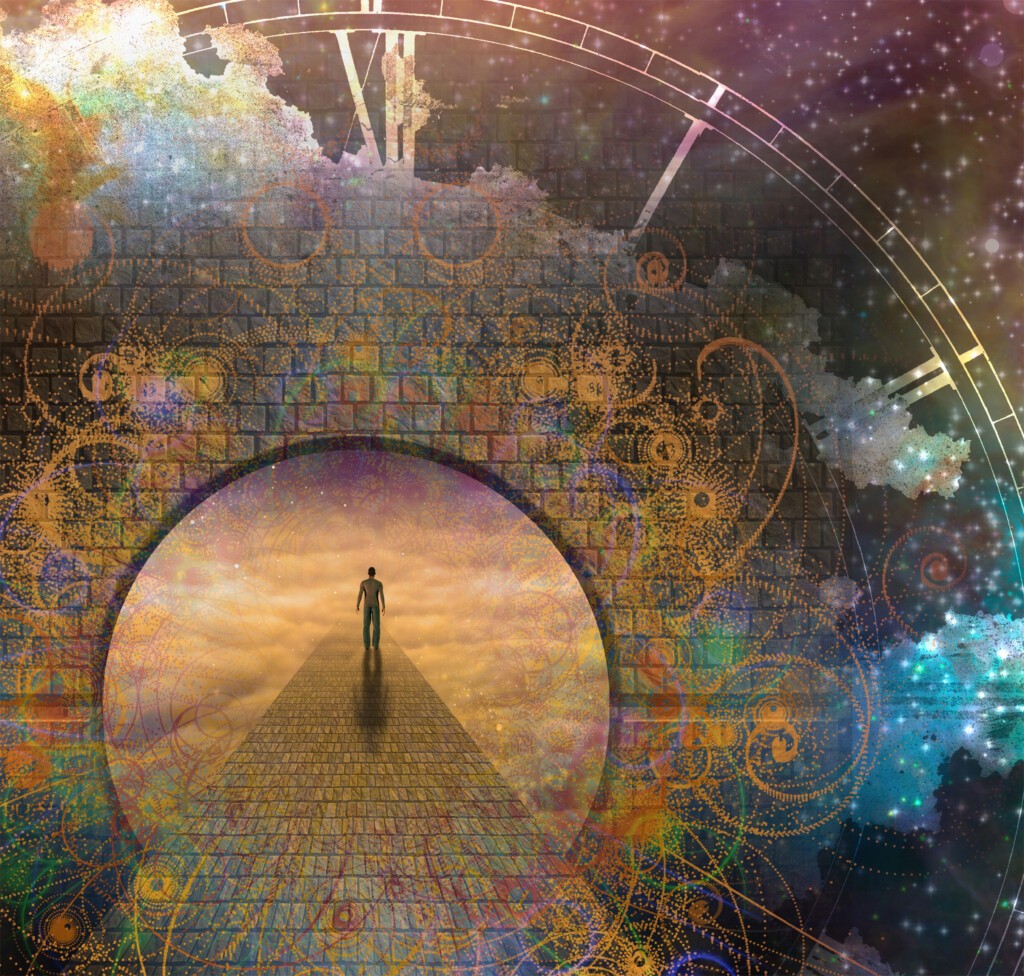To speak of eternal life is to speak of mystery—or as the Apostle Paul wrote, “The Mystery hidden for ages, Christ in you, the hope of all Glory“. It is knowing Him, not a distant reward for the devout, but a present reality gifted to all. For far too long, the idea of “eternal life” has been flattened by doctrines of man into a destination of the afterlife—an escape from earth, a prize for the faithful. But Jesus speaks differently.
On the night before His crucifixion, He lifts His eyes to heaven and reveals something astonishing: “This is eternal life, that they may know You, the only true God, and Jesus Christ whom You have sent” (John 17:3). Not a destination. Not a delay. But knowing—a very relational God, living communion with the Father and the Son.
Eternal life is not about where we go; it’s about who we are joined to. It is the divine joining into the life of God Himself, here and now. It is not about longevity—it is about life that flows from the Eternal One. The early Church understood this far better than many today. They did not reduce the gospel to moralism or contracts; they spoke in the language of transformation, union, and divine participation.
Gregory of Nyssa wrote, “The soul that draws near to God is transformed by His beauty.” Eternal life, then, is not static. It is ever-deepening. Ever-beckoning. It is the soul awakened to the infinite, unfolding glory of God and becoming more radiant in His presence.
This is the heartbeat of the gospel—not sin management, not escape from judgment, but union with the life of God. As Athanasius declared, “The Word became flesh so that we might become divine.” This was not arrogance, but awe. It was the unthinkable made real: that through Christ, humanity is welcomed into the eternal communion of Father, Son, and Spirit.
To possess eternal life is not to wait for heaven—it is to live from heaven’s fullness now. It is to awaken to Christ within, to participate in the love that has no beginning and no end. It is not a ladder we climb, but a life we receive.

When Does Eternal Life Begin?
If eternal life is union with God, then it does not begin after death—it begins the moment we awaken to Christ. The modern Church has often spoken of eternal life as though it’s a future destination dependent on a transaction pending your good behavior or changed behavior. Let’s be honest, knowing Jesus will change you. But Jesus never said, “One day you’ll receive eternal life.” He said, “Whoever hears my word and believes Him who sent Me has eternal life… he has crossed over from death to life” (John 5:24).
Catch that? Has—Present tense.
The moment faith arises—when the heart beholds the Son and believes in the Father’s sending—eternal life is not merely promised; it is possessed. We are not waiting to become partakers of the divine nature. In Christ, we already are (2 Peter 1:4).
This is the radical beauty of the New Covenant: it doesn’t postpone life; it unveils it in you now. Jesus did not come to offer a better version of the old system. He came to put the old to death and reveal a new humanity, one already reconciled in Him. “When Christ, who is your life, appears, then you also will appear with Him in glory” (Colossians 3:4). Christ is our life now. His life is not given to us later—it is the life now unfolding within us.
The early church never imagined salvation as some man-centered decision we were responsible to transact. Their hearts burned with the reality of participation now. As Irenaeus said, “The glory of God is a human fully alive.” This is not the language of those waiting for heaven—it is the cry of those already tasting it.
So when does eternal life begin?
Not after your last breath. Not when your sins are finally outweighed by good deeds. Not at the gates of heaven. It begins the moment you recognize the face of Jesus as the open arms of the Father. It begins the moment you stop striving and start abiding. It begins in the unveiling—in the beholding—of the One who is life itself.
This is not delayed glory. This is now glory. The veil is torn. The knowledge of the glory of the Lord. The gate is open. The banquet has already begun.
What Is Eternal Life in the Greek?
When Jesus defined eternal life, He didn’t use language like we hear so often preached in today’s modern church. He used the words aiōnios zōē—a phrase that, in the original Greek, carries far more weight than our English minds often allow.
Zōē is not just “life” as we casually think of it. It is not breath, biological existence, or mere survival. It is divine vitality, the very life of God Himself. It’s the same word used in John 1:4: “In Him was life (zōē), and that life was the light of men.” This is the life that hovered over creation, that spoke galaxies into being, and that breathes resurrection into dead things. Now living in you, joyfully joined to the cosmos.
And what about aiōnios? Contrary to popular thought, it does not primarily mean “endless time.” It comes from aiōn—an age, a realm, a quality beyond time. Aiōnios zōē is not about the clock. It is about the span of our origin. It is life from the eternal realm—the uncreated, divine life of God made given freely to humanity.
Jesus wasn’t saying, “Eternal life is going to heaven one day.” He was saying, “Eternal life is stepping into the divine life that has always existed in the Father and Son.” Not quantitative; it’s qualitative—life that belongs to the coming age, yet made present now through the Christ.
The early Church Fathers understood this. Clement of Alexandria, a disciple of the apostolic tradition, wrote: “The Logos of God became man so that you might learn from a man how man may become God.” He was pointing toward theosis—the divine union where eternal life is not just granted, but shared.
Origen, another early voice, reflected this understanding when he said: “To be with God is life, and the separation from God is death.” For these early believers, life was not measured by breath but by communion. Eternal life was not some futuristic end game—it was the restoration of what was always intended: unbroken fellowship with God.
And so, when Jesus says, “This is eternal life: that they may know You…” (John 17:3), the word for “know” is ginōskō—not head knowledge, but experiential intimacy. It’s the same word used for the deepest kind of union, even between husband and wife. This is not theological trivia—it is covenantal nearness. The kind of knowing that transforms.
Eternal life is not what you get for believing. Eternal life is awakened in our believing—because it is through faith that the veil is removed, and we behold the face of Christ shining within us.
The Church began not with doctrines, but with fire. Our God is a consuming fire. And that flame still burns: God did not merely send life to us. He gave Himself to us. And to have Him is to experientially know Him, His love, grace and forgiveness is to have eternal life—aiōnios zōē—now and forever.
What Is Eternal Life in the Hebrew?
If the Greek gives us clarity, the Hebrew gives us depth. While the New Testament articulates eternal life through the lens of aiōnios zōē, this idea is not new. It is rooted in the Hebrew Scriptures, in a view of life that was never abstract or merely intellectual—but always relational, embodied, and communal.
The Hebrew word often associated with “life” is chayyim (חַיִּים)—a word that is always plural. From the very beginning, in Genesis 2:7, life is described as the breath of God entering dust. “And man became a living soul.” Life, then, is not something separate from God but the very foundation and source of all life sharing Himself with us.
When the Hebrew Scriptures speak of “eternal” or “everlasting,” they use the word olam (עוֹלָם). Yet olam does not simply mean “forever” in the way our modern minds think of it. It refers to something concealed, beyond the horizon, unfolding through the ages. It suggests a hidden dimension of time—mystery stretching beyond comprehension. It is unveiled through the Son, Jesus Christ.
When the Old Testament speaks of “everlasting covenant,” it uses this word—berith olam—not to describe something endless in length, but unfailing in nature. Olam is not about time, but timelessness—about the unshakable continuity of relationship. So when we consider “eternal life” from a Hebrew perspective, we are not thinking of an immortal timeline—we are speaking of covenantal life with God, life that transcends seasons, circumstances, and even death.
The Hebrew people did not conceive of “life” apart from God. To live was to walk in hesed—steadfast love—with YHWH. As the Psalmist cried out, “In Your presence is fullness of life; at Your right hand are pleasures forevermore” (Psalm 16:11). The pleasure was not in a place, but in the presence.
For the early Christians—steeped in this Hebraic vision—eternal life was not a break from Judaism, but its fulfillment. They saw in Christ the embodiment of chayyim and olam—life beyond life, covenant without end. As Isaac of Nineveh (7th century, deeply influenced by the early patristic streams) wrote: “The love of God is not something that comes later; it is the origin of all things.”
To the Hebrew mind, eternal life was never about escaping death—it was about union with the Eternal One. It was life sustained not by breath, but by His all encompassing presence. In Christ, the hidden mystery of olam is revealed. The veil is lifted. The life that hovered beyond the horizon has stepped into time.
Jesus didn’t bring something new—He stretched forth and fulfilled something ancient. The chayyim breathed into Adam now breathes again in the second Adam. And that breath still calls to every soul: “Return to Me and live.”

What Is Eternal Life in Jesus?
Eternal life is not a concept, nor reward. It is not the answer to a test. Eternal life is Jesus Christ Himself.
He does not merely give life—He is life. “I am the way, the truth, and the life…” (John 14:6). Not a map, not a message, not a doctrine, not a method—a man. The eternal has taken on flesh. The invisible has become touchable. In Jesus, the unknowable God becomes the face we can trust.
To be in Christ is not simply to be saved from something—but to be united to Someone. “For you died, and your life is now hidden with Christ in God” (Colossians 3:3). This is not metaphor—it is mystical reality. Life, as God defines it, is not simply our breath but is union. To live is Christ. To know Him is life. To share in His communion with the Father and the Spirit is to step into the eternal dance that has always been and will never end.
This was the cry of the early Church—not screaming sin avoidance, but proclaiming our divine participation. As Gregory Nazianzen, a fourth-century Father, said: “He is made man who makes man; the Ruler of the stars is born under the stars… that He may purify like by like.” The Incarnation is the very person of eternal life becoming one with us—divine theosis, eternal life. Christ, the eternal One enters time to restore and return the cosmos back to connection with Him.
And what is He like?
He is love that never fails. He is mercy that outruns our ruin. He is light in whom there is no darkness. He is the one who seeks until He finds, the Shepherd who lays down His life for every sheep, the vine in whom we live and move and bear fruit. He is the full disclosure of the Father’s heart. As Jesus says, “If you’ve seen Me, you’ve seen the Father” (John 14:9).
This is eternal life in Jesus: not us bridging some gap created in our alienated minds, or believing in a distant God who simply tolerates us, but awakening to a present God who dwells within us. The Father does not merely forgive us in Christ—He brings us home. And the Spirit cries within us, Abba, because we have been placed not just into a new life, but into the eternal life of the Trinity.
This is not theory or fantasy—it is transformation. Not one day, but this day. Not if, but is. To awaken to this, to be persuaded by Jesus of this truth is to have eternal life—now, fully, irrevocably.
As the Apostle John wrote with burning certainty: “God has given us eternal life, and this life is in His Son. Whoever has the Son has life…” (1 John 5:11–12).
So what is eternal life in Jesus?
It is the end of distance. It is the undoing of death. It is the beginning of divine intimacy. It is the restoration of our origin and the unveiling of our destiny. It is the life we were always meant to live—life that flows from Love Himself.
You are not waiting for eternal life. Christ is revealing this truth today; that in knowing God and His Son Jesus through the unveiling power of the Holy Spirit, you are already living it.
Selah!
Gan TV Programs To Watch
-
Across All Worlds with C Baxter Kruger & Jason Clark Episode 41 – Recognizing Jesus’ Voice in Everyday Life Watch ⇒ HERE
-
Perspectives with Catherine Toon: Episode 41-Grace, Intimacy, & Seamless Union with God w/ Don Keathley – Part 1 Watch ⇒ HERE
We also believe you will love this message by Gan Tv host of Grace For All with Jamie Englehart
Sources & References
- John 17:3, John 5:24, Colossians 3:3–4, 1 John 5:11–12, Psalm 16:11, 2 Peter 1:4
- Gregory of Nyssa, “The Life of Moses”
- Gregory Nazianzen, “Orations” Read ⇒ HERE
- Athanasius, On the Incarnation
- Clement of Alexandria, Exhortation to the Greeks
- Origen, De Principiis
- Irenaeus, Against Heresies
- Isaac of Nineveh, Ascetical Homilies Read Free Download ⇒ HERE
- Strong’s Concordance (entries on aiōnios, zōē, chayyim, olam, and ginōskō)














